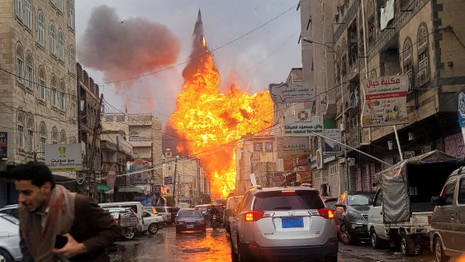
In a major escalation of Middle East tensions, Israeli strikes on Yemen capital Sanaa killed at least six people and injured 86 others, according to Houthi health officials. The air raids, which shook the city late on Sunday, August 24, 2025, targeted multiple sites including a military compound housing the presidential palace, two power plants, and a large fuel storage facility.
The Houthis, who control Sanaa and large swathes of northern Yemen, said the strikes were “brutal and indiscriminate,” accusing Israel of directly targeting civilians in densely populated areas. Residents described the capital as being “lit up by fireballs” as explosions rocked different parts of the city overnight.
Israel Confirms Strikes in Retaliation
The Israeli Defense Forces (IDF) confirmed that its air force carried out the strikes in Yemen, describing them as a direct response to recent Houthi attacks on Israeli territory. According to Israeli officials, the Houthis had launched a ballistic missile carrying cluster submunitions—a dangerous escalation in their use of advanced weaponry.
“Israel will not tolerate missile and drone attacks from Iranian-backed Houthis,” an IDF spokesperson said. “We will strike at the source of aggression wherever it originates.”
This marks one of Israel’s largest direct assaults on Houthi-controlled Yemen since the Gaza war triggered broader regional hostilities.
Civilian Toll Rising
The Houthi-run health ministry reported that six civilians were killed, including two children, while 86 others were injured, many of them seriously. Hospitals in Sanaa were said to be overwhelmed with casualties, as medics worked through the night to treat shrapnel wounds and burn victims.
Witnesses recounted harrowing scenes of destruction. “The blast threw me to the ground. My house shook like an earthquake,” said Fatimah Al-Mansouri, a Sanaa resident who lives near the presidential compound. “We don’t know why Israel is bombing us. We are already suffering from war and hunger.”
Though Israel insists it targeted only military installations, locals claim that surrounding residential neighborhoods sustained significant damage.
A Broader Regional Conflict
The Israeli strikes on Yemen capital Sanaa cannot be seen in isolation. For months, the Houthis have been launching drones and missiles against Israel and commercial shipping in the Red Sea, declaring solidarity with Palestinian groups in Gaza.
The Houthis, officially known as Ansar Allah, are backed by Iran and have grown increasingly emboldened in regional confrontations. They argue their attacks are a form of resistance against what they call “Israeli aggression in Gaza.”
Israel, however, sees the Houthis as part of a wider Iranian proxy network, alongside Hezbollah in Lebanon and militias in Iraq and Syria. Israeli officials have repeatedly warned that they would respond militarily to Houthi provocations.
International Reactions
Global powers reacted with concern to the sudden escalation. The United Nations urged all parties to exercise restraint, warning that the Yemen conflict could spiral further into a regional war.
“The Yemeni people have endured more than a decade of war and humanitarian catastrophe. New airstrikes only deepen their suffering,” said a UN spokesperson.
The United States backed Israel’s right to defend itself but called for “measured actions” to avoid unnecessary civilian casualties. Meanwhile, Iran condemned the strikes, accusing Israel of “expanding the circle of war” in the Middle East.
Humanitarian Crisis Worsens
Yemen is already in the grip of one of the world’s worst humanitarian crises. According to aid agencies, millions face starvation, and the healthcare system is barely functioning after years of conflict.
The new strikes have worsened conditions, cutting off electricity to parts of Sanaa and sparking fuel shortages as storage facilities were destroyed. Relief groups fear the situation could deteriorate rapidly if the conflict escalates further.
What’s Next?
The Israeli strikes on Yemen capital Sanaa represent a significant turning point. Until now, most Israeli responses to Houthi attacks had been limited in scale. The decision to bomb multiple strategic sites in Sanaa signals a more aggressive approach by Israel, one that could widen the scope of the war.
Analysts warn that if the Houthis continue their attacks on Israel, especially with advanced missiles, Israel may step up its military campaign in Yemen. This risks drawing in regional powers such as Iran, Saudi Arabia, and the UAE, who have their own stakes in Yemen’s long-running war.
For ordinary Yemenis, however, the latest round of violence brings only more devastation. As one local aid worker put it: “We are caught between wars that are not ours. Whether it is Israel, Saudi Arabia, or the Houthis, it is the Yemeni people who pay the price.”



